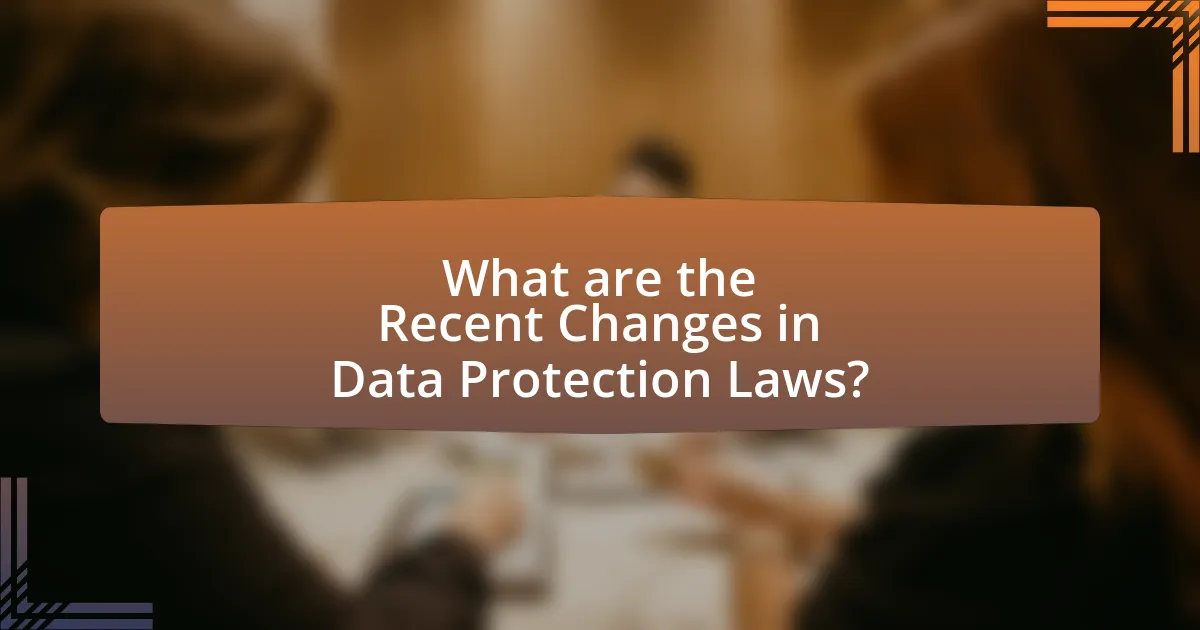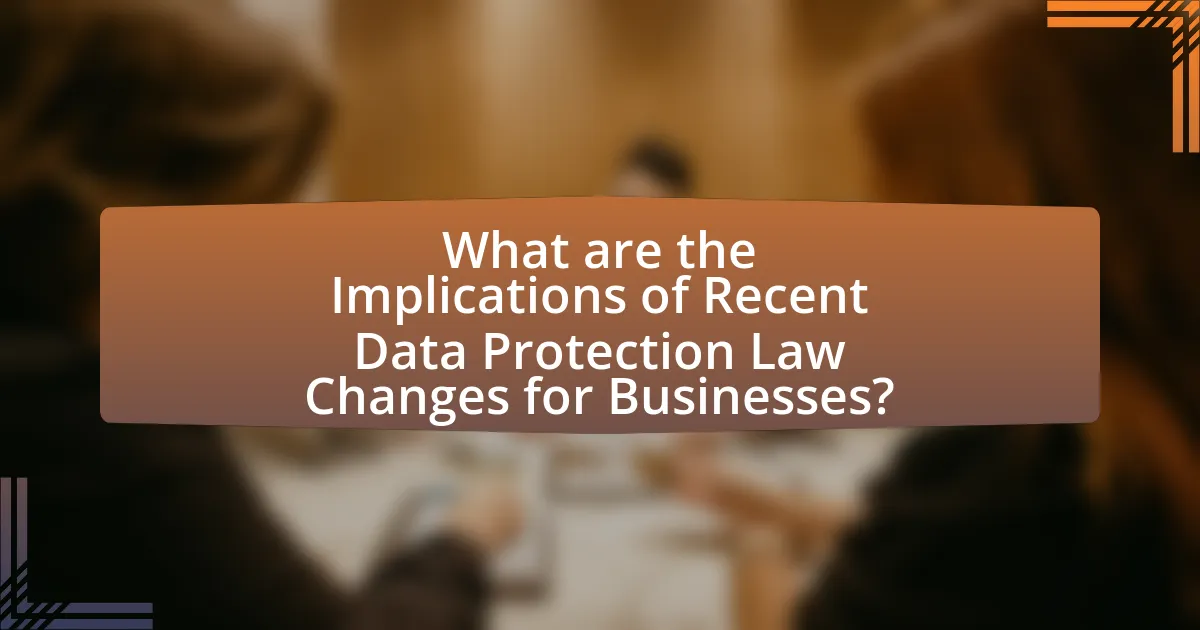Recent changes in data protection laws, notably the implementation of the General Data Protection Regulation (GDPR) in the European Union and the California Consumer Privacy Act (CCPA), have established stricter guidelines for data privacy and security. These laws enhance consumer rights, impose significant penalties for non-compliance, and reflect a global trend towards improved data protection. Businesses are now required to adopt robust data management practices, ensure transparency in data handling, and implement comprehensive compliance strategies to mitigate financial risks associated with potential violations. The article will explore the implications of these legislative changes for businesses, including the challenges they face and the strategies they can adopt to ensure compliance and enhance data security.

What are the Recent Changes in Data Protection Laws?
Recent changes in data protection laws include the implementation of the General Data Protection Regulation (GDPR) in the European Union, which has established stricter guidelines for data privacy and security. Additionally, the California Consumer Privacy Act (CCPA) has been enacted, granting California residents greater control over their personal information. These laws impose significant penalties for non-compliance, with GDPR fines reaching up to 4% of annual global revenue or €20 million, whichever is higher, and CCPA fines of up to $7,500 per violation. These changes reflect a global trend towards enhanced data protection and privacy rights, compelling businesses to adopt more robust data management practices.
How have global data protection laws evolved recently?
Global data protection laws have evolved significantly in recent years, primarily driven by increased public awareness of privacy issues and technological advancements. For instance, the implementation of the General Data Protection Regulation (GDPR) in the European Union in 2018 set a new standard for data protection, influencing legislation worldwide. Countries such as Brazil with its Lei Geral de Proteção de Dados (LGPD) and California with the California Consumer Privacy Act (CCPA) have adopted similar frameworks, emphasizing user consent, data access rights, and penalties for non-compliance. These developments reflect a global trend towards stricter data privacy regulations, aiming to enhance consumer protection and accountability among businesses handling personal data.
What are the key legislative changes in major jurisdictions?
Key legislative changes in major jurisdictions regarding data protection include the implementation of the General Data Protection Regulation (GDPR) in the European Union, which established strict guidelines for data collection and processing, enhancing individuals’ rights over their personal data. In the United States, the California Consumer Privacy Act (CCPA) introduced significant consumer privacy rights, allowing residents to know what personal data is collected and to whom it is sold. Additionally, Brazil’s Lei Geral de Proteção de Dados (LGPD) mirrors GDPR principles, enforcing data protection standards across various sectors. These changes reflect a global trend towards stricter data privacy regulations, emphasizing accountability and transparency in data handling practices.
How do these changes reflect current data privacy concerns?
Recent changes in data protection laws reflect heightened data privacy concerns by imposing stricter regulations on how businesses collect, store, and process personal information. These laws, such as the General Data Protection Regulation (GDPR) in Europe and the California Consumer Privacy Act (CCPA) in the United States, require organizations to obtain explicit consent from individuals before using their data, thereby prioritizing user autonomy and transparency. The implementation of these regulations is a direct response to increasing public awareness and anxiety over data breaches and misuse of personal information, as evidenced by a 2021 survey indicating that 79% of Americans are concerned about how their data is being used by companies.
Why are these changes significant for businesses?
Recent changes in data protection laws are significant for businesses because they impose stricter compliance requirements and increase the potential for substantial penalties for non-compliance. For instance, the General Data Protection Regulation (GDPR) mandates that organizations must implement robust data protection measures and obtain explicit consent from individuals before processing their personal data. Failure to comply can result in fines up to 4% of annual global turnover or €20 million, whichever is higher. This financial risk compels businesses to invest in data security and privacy measures, thereby reshaping their operational strategies and increasing the importance of data governance in their overall business model.
What risks do businesses face due to non-compliance?
Businesses face significant risks due to non-compliance with data protection laws, including hefty financial penalties, legal liabilities, and reputational damage. For instance, the General Data Protection Regulation (GDPR) imposes fines of up to 4% of annual global turnover or €20 million, whichever is higher, for violations. Additionally, non-compliance can lead to lawsuits from affected individuals or entities, resulting in further financial strain. Reputational damage can also occur, as consumers are increasingly aware of data privacy issues and may choose to avoid businesses that fail to protect their information. These risks highlight the critical importance of adhering to data protection regulations to safeguard both financial stability and public trust.
How can businesses benefit from adapting to these changes?
Businesses can benefit from adapting to recent changes in data protection laws by enhancing customer trust and compliance, which can lead to increased customer loyalty and market competitiveness. By aligning their practices with new regulations, businesses demonstrate a commitment to safeguarding personal data, which is increasingly valued by consumers; for instance, a study by Cisco found that 84% of consumers care about data privacy and are more likely to engage with companies that prioritize it. Furthermore, compliance with these laws can help businesses avoid significant fines and legal repercussions, as seen in the enforcement of the General Data Protection Regulation (GDPR), where companies faced penalties of up to 4% of their annual global turnover for violations. Thus, adapting to these changes not only mitigates risks but also positions businesses favorably in a data-conscious market.

What are the Implications of Recent Data Protection Law Changes for Businesses?
Recent changes in data protection laws significantly impact businesses by imposing stricter compliance requirements and increasing penalties for non-compliance. Businesses must now enhance their data governance frameworks, implement more robust security measures, and ensure transparency in data processing activities. For instance, the General Data Protection Regulation (GDPR) mandates that organizations demonstrate accountability and obtain explicit consent from individuals before processing their personal data. Failure to comply can result in fines up to 4% of annual global turnover or €20 million, whichever is higher. This regulatory environment compels businesses to invest in data protection technologies and training, ultimately reshaping their operational strategies to prioritize consumer privacy and data security.
How do these laws affect data handling practices?
Recent changes in data protection laws significantly impact data handling practices by imposing stricter compliance requirements on businesses. These laws, such as the General Data Protection Regulation (GDPR) in Europe, mandate that organizations implement robust data protection measures, including obtaining explicit consent from individuals before processing their personal data. Additionally, businesses must ensure transparency in data collection and usage, provide individuals with rights to access and delete their data, and report data breaches within a specified timeframe. For instance, under GDPR, failure to comply can result in fines up to 4% of annual global turnover or €20 million, whichever is higher, thereby incentivizing organizations to adopt more rigorous data handling protocols.
What new requirements must businesses implement?
Businesses must implement enhanced data protection measures, including stricter consent protocols, data minimization practices, and improved transparency in data processing. These requirements stem from recent changes in data protection laws, such as the General Data Protection Regulation (GDPR) in Europe, which mandates that organizations obtain explicit consent from individuals before collecting their personal data. Additionally, businesses are required to limit data collection to only what is necessary for their stated purpose, thereby reducing the risk of data breaches and misuse. Compliance with these regulations is essential to avoid significant fines and legal repercussions, as evidenced by the enforcement actions taken against companies that fail to adhere to GDPR standards, which can reach up to 4% of annual global turnover.
How can businesses ensure compliance with these laws?
Businesses can ensure compliance with data protection laws by implementing comprehensive data governance frameworks. These frameworks should include regular audits, employee training on data handling practices, and the establishment of clear data processing policies. For instance, the General Data Protection Regulation (GDPR) mandates that organizations conduct Data Protection Impact Assessments (DPIAs) when processing personal data that may pose a high risk to individuals’ rights and freedoms. Additionally, maintaining transparent communication with customers about data usage and obtaining explicit consent for data collection are critical steps in compliance. Statistics show that organizations with robust compliance programs can reduce the risk of data breaches by up to 50%, highlighting the effectiveness of proactive measures in adhering to legal requirements.
What are the potential financial impacts on businesses?
The potential financial impacts on businesses due to recent changes in data protection laws include increased compliance costs, potential fines for non-compliance, and the need for investment in data security measures. Compliance costs can rise significantly as businesses may need to hire additional staff or consultants to ensure adherence to new regulations, such as the General Data Protection Regulation (GDPR), which imposes strict guidelines on data handling. For instance, companies that fail to comply with GDPR can face fines up to 4% of their annual global turnover or €20 million, whichever is higher. Additionally, businesses may incur expenses related to upgrading technology and training employees to manage data responsibly, further straining financial resources.
What costs are associated with compliance and non-compliance?
Compliance with data protection laws incurs costs such as legal fees, training expenses, and implementation of necessary technology systems. For instance, businesses may spend an average of $1.4 million on compliance-related activities, including hiring compliance officers and conducting audits. Non-compliance, on the other hand, can lead to significant financial penalties, with fines reaching up to 4% of annual global revenue or €20 million, whichever is higher, as stipulated by the General Data Protection Regulation (GDPR). Additionally, non-compliance can result in reputational damage, loss of customer trust, and potential litigation costs, which can further escalate financial burdens on businesses.
How can businesses mitigate financial risks related to data breaches?
Businesses can mitigate financial risks related to data breaches by implementing comprehensive cybersecurity measures, including regular security audits, employee training, and incident response plans. These strategies help identify vulnerabilities, educate staff on best practices, and ensure a swift response to breaches, thereby reducing potential financial losses. For instance, according to the 2021 Cost of a Data Breach Report by IBM, organizations with an incident response team in place saved an average of $2 million compared to those without such teams. This demonstrates that proactive measures significantly lower the financial impact of data breaches.

What Strategies Should Businesses Adopt in Response to Data Protection Law Changes?
Businesses should adopt a proactive compliance strategy in response to data protection law changes. This involves conducting comprehensive audits of current data practices to identify gaps in compliance, updating privacy policies to reflect new legal requirements, and implementing robust data security measures to protect personal information. For instance, the General Data Protection Regulation (GDPR) mandates that organizations must demonstrate accountability and transparency in their data handling processes, which necessitates regular training for employees on data protection principles. Additionally, businesses should establish clear protocols for data breach response, as timely notification is crucial under laws like the GDPR, which imposes strict timelines for reporting breaches. By integrating these strategies, businesses can mitigate risks associated with non-compliance and enhance consumer trust.
How can businesses develop effective data protection policies?
Businesses can develop effective data protection policies by conducting a thorough risk assessment to identify vulnerabilities and compliance requirements. This process involves evaluating the types of data collected, understanding applicable regulations such as the General Data Protection Regulation (GDPR) and the California Consumer Privacy Act (CCPA), and determining potential risks associated with data handling.
Once risks are identified, businesses should establish clear data governance frameworks that outline roles, responsibilities, and procedures for data management. Implementing technical measures such as encryption, access controls, and regular security audits further strengthens data protection.
Additionally, training employees on data protection best practices and fostering a culture of privacy awareness are essential for compliance and risk mitigation. According to a report by the Ponemon Institute, organizations with comprehensive training programs experience 50% fewer data breaches, highlighting the importance of employee education in effective data protection strategies.
What elements should be included in a data protection policy?
A data protection policy should include elements such as data collection procedures, data usage guidelines, data storage and retention policies, data access controls, data sharing protocols, data breach response plans, and employee training requirements. These components ensure compliance with regulations like the General Data Protection Regulation (GDPR), which mandates that organizations protect personal data and uphold individuals’ rights regarding their information. For instance, GDPR requires clear consent for data collection and mandates that organizations implement appropriate security measures to protect data, thereby reinforcing the necessity of these elements in a comprehensive data protection policy.
How can businesses train employees on data protection practices?
Businesses can train employees on data protection practices by implementing comprehensive training programs that cover legal requirements, data handling procedures, and security protocols. These programs should include regular workshops, e-learning modules, and practical exercises to ensure employees understand their responsibilities under data protection laws such as the General Data Protection Regulation (GDPR) and the California Consumer Privacy Act (CCPA). Research indicates that organizations with structured training programs see a 50% reduction in data breaches, highlighting the effectiveness of such initiatives in fostering a culture of compliance and awareness among employees.
What best practices can businesses follow to enhance data security?
Businesses can enhance data security by implementing strong access controls, regularly updating software, and conducting employee training on security protocols. Strong access controls limit data access to authorized personnel only, reducing the risk of data breaches. Regular software updates patch vulnerabilities that could be exploited by cybercriminals, as evidenced by the fact that 60% of breaches are linked to unpatched software. Employee training ensures that staff are aware of phishing attacks and other security threats, which is crucial since human error accounts for 95% of cybersecurity incidents.
How can technology solutions aid in compliance and security?
Technology solutions can significantly aid in compliance and security by automating processes, enhancing data protection, and ensuring adherence to regulations. For instance, software tools can streamline the management of compliance documentation, reducing human error and improving accuracy. Additionally, technologies such as encryption and access controls protect sensitive data, which is crucial under regulations like the General Data Protection Regulation (GDPR) that mandates strict data handling practices. Furthermore, real-time monitoring systems can detect and respond to security breaches promptly, thereby minimizing potential risks and ensuring compliance with legal requirements. These capabilities demonstrate how technology not only facilitates compliance but also strengthens overall security posture for businesses navigating evolving data protection laws.
What role does regular auditing play in maintaining compliance?
Regular auditing is essential for maintaining compliance with data protection laws, as it systematically evaluates an organization’s adherence to legal requirements and internal policies. By conducting regular audits, businesses can identify gaps in compliance, rectify issues proactively, and ensure that they are aligned with evolving regulations, such as the General Data Protection Regulation (GDPR) and the California Consumer Privacy Act (CCPA). These audits provide documented evidence of compliance efforts, which is crucial for demonstrating accountability to regulatory bodies and mitigating potential legal risks.
What are the common challenges businesses face in adapting to these changes?
Businesses commonly face challenges such as compliance complexity, resource allocation, and employee training when adapting to recent changes in data protection laws. Compliance complexity arises from the need to understand and implement new regulations, which can vary significantly across jurisdictions. For instance, the General Data Protection Regulation (GDPR) introduced stringent requirements that many organizations struggle to meet, leading to potential legal penalties. Resource allocation challenges occur as businesses must invest in new technologies and processes to ensure compliance, which can strain budgets and divert funds from other critical areas. Additionally, employee training is essential to ensure that staff understand the new regulations and their implications, yet many organizations find it difficult to provide adequate training due to time constraints and varying levels of employee awareness. These challenges collectively hinder businesses’ ability to effectively adapt to evolving data protection laws.
